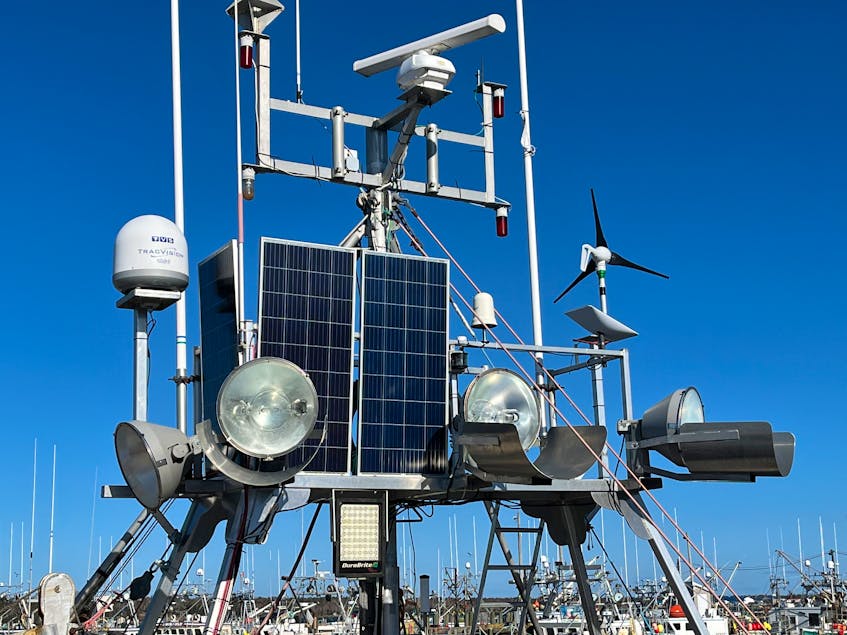A win-win: Solar and wind-power energy systems installed on fishing boats in southwestern Nova Scotia – SaltWire NS
STORY CONTINUES BELOW THESE SALTWIRE VIDEOS
Cineplex shuts its doors in Bridgewater | SaltWire #novascotia #cineplex #bridgewater #closure
Twenty-four fishing boats in the southwestern Nova Scotia fleet are now outfitted with solar and wind turbine-powered energy systems as a way to reduce fossil fuel consumption and greenhouse gases.
Installed on the top of wheelhouses, the off-grid energy systems keep the vessel’s batteries charged, the bilge pumps working and a heater running when it is berthed at its home port without running the main engine, or connecting to shore power.
The Brazil Rock 33 34 Lobster Association received $174,725 in funding through the Fisheries and Aquaculture Clean Technology Adoption Program (FACTAP) for the project.
The program covered 75 per cent of the cost to install the system on a boat.
“We’ve applied land technology to the ocean it seems to be working. We’ve had these on four or five months now and they’re working great,” said Dan Fleck, executive director of the Brazil Rock 33 34 Lobster Association.
The project began when the association started doing some research into off-grid living and wind and solar power to keep boats’ batteries charged, said Fleck.
“We took some equipment, modified it to what we want to do. Designed it for this part of the North Atlantic because in the winter months, we don’t have a whole lot of daylight, that’s when we rely on the wind. If we don’t have wind, which is rare, we have the sunshine to create solar and that keeps the batteries fully charged all the time.”
The systems eliminate the need for vessels to be connected to shore power, which is not available at all wharves.
“If you don’t have shore power, you don’t have heat. How do you keep everything from freezing in your boat, all of your electronics?” said Fleck.
“A lot of times captains have to go down and check their boats and run them for a day or if it’s in real cold weather the boat might run for days on end,” he said. “Different times in the summer, or on a mooring, they’ve got to go check the boat once a day to make sure the batteries are good and the pumps are working.”
On average, Fleck said a propulsion engine aboard a boat will burn approximately 26 liters per hour.
“Without having that engine running between fishing trips, we came up with a small heater that burns about a cup an hour. It doesn’t take long to see the financial savings between 26 litres per hour or a cup an hour,” he said.
The solar and wind system keeps the batteries fully charged all the time. If there is a big rainstorm or something else, it keeps the pumps working.
“It will pump out the boat. The batteries are always fully charged and the heaters keep the engine room and the wheelhouse toasty warm,” said Fleck.
“When you look at the cost, every boat is different. But if you can save money nowadays while helping the environment it’s a win-win all the way around,” Fleck said.
Michael Larkin, president of Brazil Rock, is one of the fishermen who has installed one of the solar and wind turbine-powered energy systems on his fishing vessel, the Bradley & Emma.
“It keeps the batteries charged. That was the main purpose, so I could keep things charged in the boat, especially during the winter months,” said Larkin. “The savings are there because I don’t have to run the generators or the main engine at any time. I think it’s a good worthwhile project. It seems to be working.”
Fleck said Brazil Rock is trying to secure additional funding so it can do more solar and wind power system installations on member’s vessels.
“We have a list of other members who want to do it,” he said.
Fleck also said they are exploring other future projects. For instance, there is talk of dehumidifiers on board boats for the summer months, when boats might not be used.
“Think of the condensation inside that boat, which is going to be hard on your computer, radar, navigation, radio all your electronics,” Fleck said. “That will extend the life of electronics.”
Bookmark our website and support our journalism: Don’t miss the news you need to know — add saltwire.com to your bookmarks and sign up for our newsletters here.


